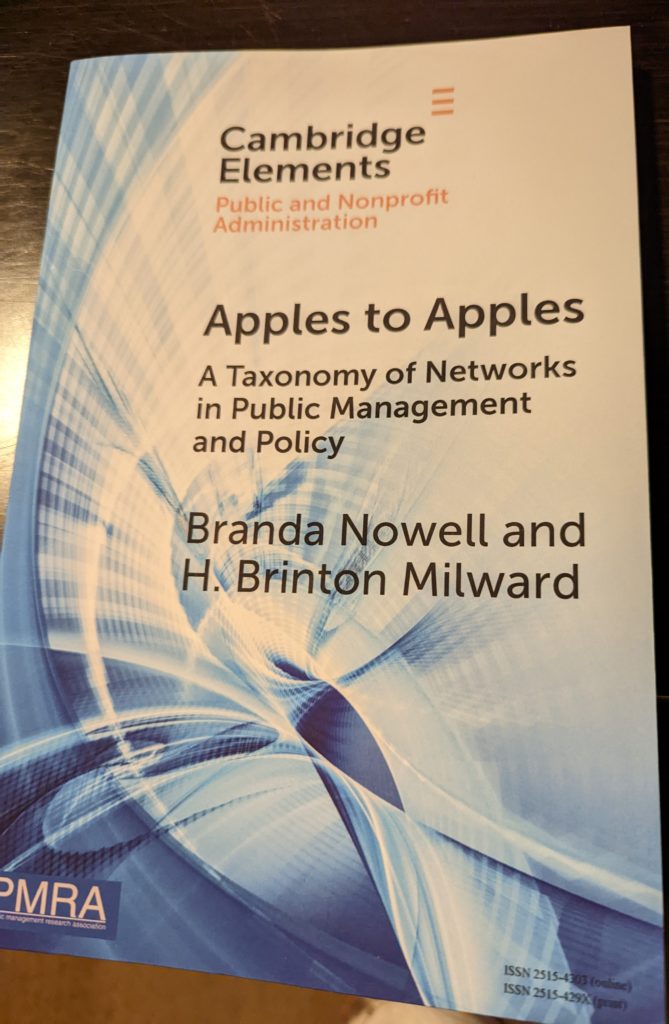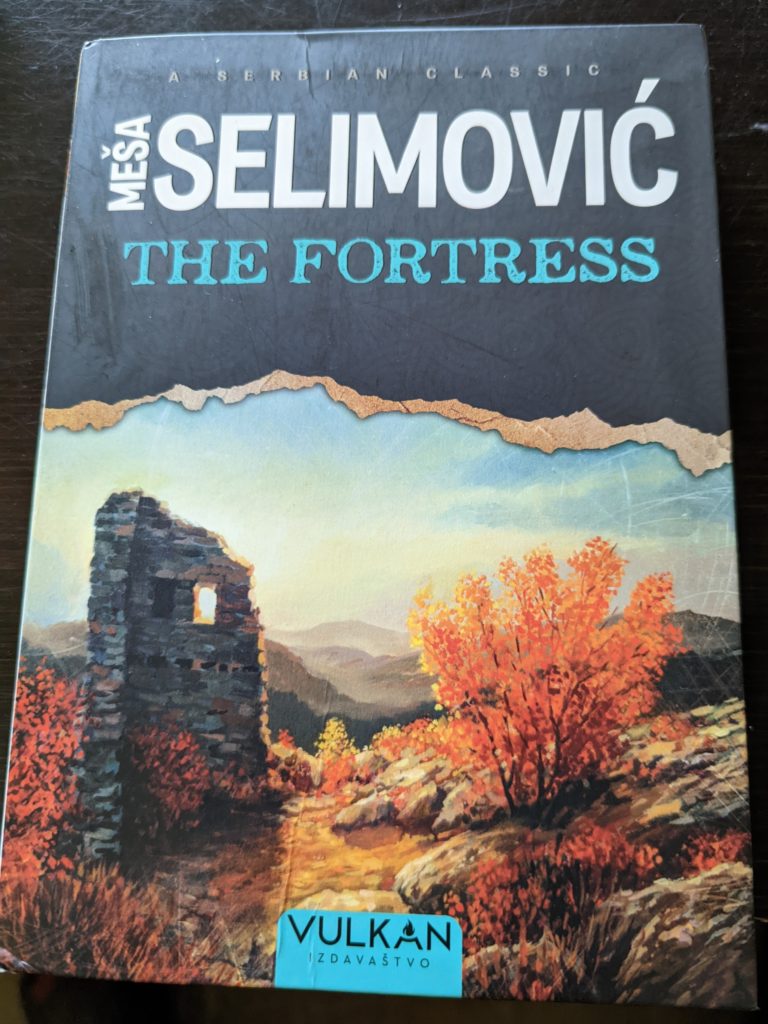
Here is a new recording of James Thornton reading from his short essay collection Nature Is My Teacher. James has a warm voice full of humor, compassion, and wisdom.
Listen to all recordings at So I Have Heard

Here is a new recording of James Thornton reading from his short essay collection Nature Is My Teacher. James has a warm voice full of humor, compassion, and wisdom.
Listen to all recordings at So I Have Heard
Heraclitus did not say that one cannot step into the same river twice. One of his followers did. (172)
#DMGuidetoIllustriousPersons
Heraclitus did say that praying to statues of the gods was like talking to a house instead of to its owner, however. (173)
#DMGuidetoIllustriousPersons
And that souls smell in Hades. (174)
#DMGuidetoIllustriousPersons
A. E. Housman never in his life lived in Shropshire. (175)
#DMGuidetoIllustriousPersons #DM Map
Ralph Roister-Doister. (176)
#DMBookshelf
Of love I make my mone.
It took eight years to sell the first printing of six hundred copies of The Interpretation of Dreams. (177)
#DMBookshelf #Numbers
Our sister, death. (178)
#DMBookshelf
Perhaps one solitary mourner appearing, regularly, at one grave. Here again, a woman. Young. In fact too young to have a connection with anyone buried here that Protagonist can fathom.
Or are some few of the graves more recent? (179)
#Reader/Protagonist
Check out other posts from the Markson Project here.
Check out other work in the Light series here.
Political Philosophy should start with the citizen not the political structure. People in general, political philosophers, and even career politicians are almost never in a position to choose a political structure, or even change the one that they are in. Any answers to the question of what political/social organization is best for man can rarely if ever be applied. On the other hand, we always find ourselves being governed in some form: democracy in all its stripes, oligarchy, aristocracy, theocracy, kleptocracy…. What capacities do citizens have to make whatever political structure they live in better? Any knowledge gained from asking this question has ample opportunity to be applied and is therefore more profitable to ask.
Check out all the work in the collection: The Social Unit
A listing still exists of the winning runners in the Olympic Games from 776 B.C. through the next 993 years. Events in Greek history were dated by the Olympiad in which they occurred. (164)
#DMTimeline #Numbers
Kant was an anti-Semite. (165)
#DMGuidetoIllustriousPersons #Bigotry
That garage area, at the rear, looks out onto little more than scrub and brush. There is a path Raskolnikov/Bloom follows through the dunes, but heading away diagonally, so that he has almost no view of the upper story then either. (166)
#Reader/Protagonist #DMCastofCharacters #DMBookshelf
Anaximander was sixty-four years old in the second year of the fifty-eighth Olympiad.
Being how Diogenes Laërtius once situates him. (167)
#DMGuidetoIllustriousPersons #Numbers
What’s Xanadu without Porlock, however?
Would some sort of deck on the upper story face the ocean? How distantly perceived from the beach when Protagonist strolls there? (168)
#Reader/Protagonist
Only a lunatic would dance when sober, said Cicero. (169)
#DMGuidetoIllustriousPersons
Behold, I have heard that there is corn in Egypt. (170)
#DMBookshelf #DMquotations #DM Map
How many years have passed since the last burial in the cemetery? Do mourners still appear? (171)
#Reader/Protagonist
Check out other posts from the Markson Project here.
Check out other work in the Light series here.
The day my divorce papers came, I wondered if Snevets had a relationship? Which, in hindsight, was part of my problem. Obsession rarely leaves time for intimacy. I sat at my kitchen table in an empty house, staring at the papers wondering if there was a Mrs. Snevets or a Snevette. If so, I imagine she felt similarly ignored. Still it was hard to imagine a Snevets courtship. It was hard to imagine Snevets young for that matter. Had he ever lost it for someone–this very deliberate man? Youth does strange things to us all. Was he currently living down some passion, or perhaps its disappointment?
Check out other posts from The Snevets Stories here.
I found this far back in my photo archives.

Check out other work in the Paint Chips, Cracks, and Decay series here.
At twenty, Bach made a pilgrimage of more than two hundred miles, on foot, to hear Buxtehude play the organ. (153)
#DMGuidetoIllustriousPersons #Numbers #GreatsOnGreats
Ship me somewheres east of Suez. (154)
#DMBookshelf #DMquotations #DM Map
If a writer has to rob his mother, he will not hesitate; the Ode on a Grecian Urn is worth any number of little old ladies. (155)
#DMBookshelf #DMquotations
A person on business from Porlock. (156)
#DM Map
I think each of my children are somehow from Porlock.
Aldonza Lorenzo. (157)
#DMCastofCharacters #DMBookshelf
Raskolnikov wrote some books once. (158)
#Reader/Protagonist #DMCastofCharacters #DMBookshelf
Very little happened in connection with any of them. In any
event that was long ago. (159)
#Reader/Protagonist
Jack London committed suicide. (160)
#DMGuidetoIllustriousPersons #ThisIsTheEndMyFriend
Bruno Schulz was carrying home a loaf of bread when he was shot down in the street by the Gestapo. (161)
#DMGuidetoIllustriousPersons #ThisIsTheEndMyFriend
Protagonist reading. Hearing them, up above. (162)
#Reader/Protagonist
My wife too.
Mussorgsky died raving mad from drink. (163)
#DMGuidetoIllustriousPersons#ThisIsTheEndMyFriend
Check out other posts from the Markson Project here.
I have had the pleasure of recording Siken twice now, originally for Crush and now for War of the Foxes. We recorded this two poems from the collection in Tucson, Arizona, where Siken lives. The first is Logic and the other the titular poem War of the Foxes.
Listen to all recordings at So I Have Heard
Political Science has been primarily focused on the ideal form of government for any given society. What if instead we reversed the question and asked what is the ideal citizen? Said another way, what are the skills and qualities of a citizen that make that citizen’s government responsive to it, regardless what form that government happens to take?
Check out all the work in the collection: The Social Unit
Check out other work in the Paint Chips, Cracks, and Decay series here.
Check out other work in the Uncollected series here.
Preferably separate entrances. The house on a dune, possibly, with Protagonist and the others coming and going along opposite sides of the slope. (145)
#Reader/Protagonist
And with Protagonist’s entrance in the rear, a sort of basement? Possibly what had once been an indoor garage? (146)
#Reader/Protagonist
Ergo almost never seeing these women, merely being aware of their proximity. Or hearing them, on occasion. (147)
#Reader/Protagonist
Raskolnikov. Bloom. Mr. Kurtz. (148)
#Reader/Protagonist #DMCastofCharacters #DMBookshelf
Given Reader’s indecision about so many aspects of this narrative. Can we also say Hamlet?
Rochester died in 1680. A full collection of his verse was not published until 1926.
And even then was not allowed into the United States. (149)
#DMGuidetoIllustriousPersons #DMTimeline #DM Map #ThisIsTheEndMyFriend
Flaubert’s lamp burned with such regularity late at night in his workroom at Croisset that pilots on the Seine were able to take their bearings from it. (150)
#DMGuidetoIllustriousPersons #DM Map
Or would Raskolnikov surely at least sometimes see them from other vantage points? (151)
#Reader/Protagonist #DMCastofCharacters #DMBookshelf
In this house the same initial impermanence, the same cartons. (152)
#Reader/Protagonist
Check out other posts from the Markson Project here.
Check out other work in the Dirty Dish Gallery here.
Watching six seasons of the Nanny while my long-term relationship fell apart
Was more self-inflicted boredom than nostalgia
As Maxwell chased Fran up and down the staircase with a frying pan
And I lay in bed, listening to the distant sound of trains
Pulling their shit-for-brains cargo through the dark
There are some months when all art feels worthless
And life feels thin, and weak and full of spite
And the pastel hysteria of spring of outside the window
Just makes me wince with disappointment and rage
And the total, mind-numbing futility of it all
Often, I think about the man who walked into the National Gallery
And punched a hole straight into a ten million-dollar Monet painting
Of a sailboat, drifting down a river of autumn leaves
And got sent to prison for five years
There’s nothing in this world more boring than heartbreak
It’s like a tax audit of the soul
And what once seemed rare and poignant
And full of emotional promise
Just makes me want to dose myself to the brim with horse tranquilizers
And take a long vacation to skeleton town
There’s only so much sitting by the window
Begging the moon for punishment
You can take, before you have to get mad
And stride up and down the toiletries aisles of the grocery store
Wishing every old woman painstakingly reading the back of a Listerine packet
An expedient journey to hell
and all the poets you loved
reveal themselves to be little bitches
Whose constant need to reupholster their pain
seems sad & extravagant
like grief factories, polluting the local waterways with pathos and nuance
The present has overflowed and turned the whole past bad
Ancient Greece, art nouveau, the entire Italian renaissance
All ruined
Monet too, with his surfeit of waterlilies
Wilting in the heat like a loose-leaf salad
I sit like Nostradamus
In my kingdom of disappointment
Burning down the cities of the future
Going through my google calendar
listing all the bad things to come
By Hera Lindsay Bird
Check out other work in the Strange Faces Other Minds series.
Early on, Protagonist will naturally become familiar with most of the gravestones. (132)
#Reader/Protagonist
Both of Paul Celan’s parents went to their deaths in German concentration camps. (133)
#DMGuidetoIllustriousPersons #ThisIsTheEndMyFriend #Bigotry
Rudyard Kipling once lived in Vermont. (134)
#DMGuidetoIllustriousPersons #DM Map
After Cesare Pavese committed suicide, several young women none of his friends had ever seen before appeared at his funeral weeping, in the hope of being taken for former mistresses. (135)
#DMGuidetoIllustriousPersons #ThisIsTheEndMyFriend
They make a desert and they call it peace. (136)
#DMBookshelf #DMquotations
Tacitus conceived of Spain being due west of Britain.
The Knight of Pentacles, Reversed: A brave Man, but out of Employment, Idle, Negligent. (137)
Boris Pasternak so admired Rilke that he carried two letters from him in his wallet for decades. (138)
#DMGuidetoIllustriousPersons #Numbers #GreatsOnGreats
Nothing now, but Protagonist’s books.
Those, and the graves of strangers. (139)
#Reader/Protagonist
Working as a publisher’s reader, George Meredith rejected The Way of All Flesh.
Working as a publisher’s reader, André Gide rejected Swann’s Way. (140)
#DMGuidetoIllustriousPersons #DMBookshelf #GreatsOnGreats
Saint Hildegard of Bingen. (141)
#DMGuidetoIllustriousPersons #DM Map
Collector is wondering if this project is even possible?
Or would Reader rather see Protagonist live somewhere else entirely?
An isolated house at a beach, for instance? (142)
#Reader/Protagonist
Although perhaps without the even more absolute solitude that might establish?
At least with others on a floor above? A woman? Women? (143)
#Reader/Protagonist
Tomorrow it will rain in Bouville. (144)
#DMBookshelf #DMquotations #DM Map
Check out other posts from the Markson Project here.

Check out other work in the Uncollected series here.
The general increase in green
accords in me
with a growing and specific gravity
about — it hopes —
to be undone like a bud.
What kind of leaf
or the existence of bugs
or the always later rumor
of ravishment by wind or water
don’t interest me.
Sun does.
Come close.
Come slow.
And look me again in the eyes
as you do.
by Liz Waldner
Check out other work in the Strange Faces Other Minds series.
Once, not knowing which of several houses was Bizet’s, Saint-Saëns simply stood in the road singing an aria from Les Pêcheurs de Perles. (111)
#DMGuidetoIllustriousPersons #GreatsOnGreats
Surely, a clerk from the liquor store where Protagonist had already stopped in two or three times for cheap wine, recognizing him? (112)
#Reader/Protagonist
At twenty, Joseph Conrad tried to commit suicide over gambling losses.
In later life managing to let people believe the bullet wound had come from a duel. (113)
#DMGuidetoIllustriousPersons #PoorMadDirtyDrunkAlone
The cemetery is in the oldest section of the town, and the few dwellings on the opposite side of the street, modest and rundown themselves, seem to house very few residents. A point being that no one questions Protagonist’s presence.
Nor is the fence mesh at that, rather it is a more traditional cemetery construction of tall iron spikes. The gate at the entrance is partly unhinged and askew.
The paths inside are of gravel, or were, long since thinned and scattered. (114)
#Reader/Protagonist
Is there a need to explain the house’s availability? (115)
#Reader/Protagonist
Obviously a former gatekeeper’s or superintendent’s. (116)
#Reader/Protagonist
William Butler Yeats was an anti-Semite. (117)
#DMGuidetoIllustriousPersons #Bigotry
A neighbor once came upon William Blake and his wife Catherine reading Paradise Lost aloud in their garden. Sitting naked. (118)
#DMGuidetoIllustriousPersons #DMBookshelf
Milton in the buff.
Robert Moses Grove. (119)
#DMGuidetoIllustriousPersons
Manet was so vituperatively condemned by critics that for a time he was too embarrassed to ask anyone to pose for him.
Before Cézanne had gained any recognition he once burst into tears when someone sincerely admired his work. (120)
#DMGuidetoIllustriousPersons
Nothing now, but my books. (121)
#Reader/Protagonist
Haller’s books? Selkirk’s? (122)
#DMGuidetoIllustriousPersons #Reader/Protagonist #DMCastofCharacters #DMBookshelf
The Persians deployed so many bowmen at Thermopylae that it was said their arrows would blot out the sun.
To which a Spartan commander: All the better, then we will be fighting in the shade. (123)
#DMquotations #DM Map
In his mid-thirties, T. S. Eliot was known to wear pale green face powder. One of the Sitwells said it was to make him look as if he were suffering. (124)
#DMGuidetoIllustriousPersons #GreatsOnGreats
Reader’s Block 193 pages, This Is Not A Novel 190 pages
Dietrich Fischer-Dieskau was an American prisoner of war in Italy at the end of World War II. (125)
#DMGuidetoIllustriousPersons #DM Map
Should Protagonist possibly have written books of his own once? Unnamed and undescribed, mentioned almost incidentally?
Once, he wrote a few books. That was long ago. (126)
#Reader/Protagonist
Nobody comes. Nobody calls. (127)
#Reader/Protagonist
Vanishing Point 191 pages, The Last Novel 190 pages.
Rossini wore a wig. In chilly weather he sometimes wore two. (128)
#DMGuidetoIllustriousPersons
In fact only two Spartans survived Thermopylae. One was killed in battle elsewhere. The other hanged himself in disgrace. (129)
#DM Map #ThisIsTheEndMyFriend
800 pages of whatnot.
Cervantes was a tax collector during the outfitting of the Armada.
And was imprisoned when his accounts did not balance. (130)
#DMGuidetoIllustriousPersons
Je crois entendre encore. (131)
#DMquotations
Check out other posts from the Markson Project here.

Check out other posts from The Mantra of Craft T-shirt Gallery.
Check out more Ear Candy here.
Not far into the story, Robinson Crusoe swims out to the wreck of his ship with no clothes on.
In the selfsame paragraph Defoe has him filling his pockets with biscuits. (105)
#DMGuidetoIllustriousPersons #DMCastofCharacters #DMBookshelf
Should Reader determine a name for Protagonist at this juncture after all?
#Reader/Protagonist
Ishmael. Meursault. Harry Haller. (106)
#Reader/Protagonist #DMCastofCharacters #DMBookshelf
Should he give him children, if he is still being in part autobiographical? (107)
#Reader/Protagonist
A son and a daughter, then? (108)
#Reader/Protagonist
Zeno hanged himself after breaking a toe. At ninety. (109)
#DMGuidetoIllustriousPersons #ThisIsTheEndMyFriend
Alexander Selkirk. (110)
#DMGuidetoIllustriousPersons
Check out other posts from the Markson Project here.
Check out other work in the Bookshelf series here.
Four score and seven years ago our fathers brought forth on this continent, a new
nation, conceived in liberty, and dedicated to the proposition that all men are
created equal.
That’s how Abraham Lincoln started the Gettysburg address and he got
murdered in a theatre.
That’s also how I have started my speech but I won’t be murdered in a theatre.
When I die, it will be an old-time injury, like falling into a threshing machine.
I am always making speeches, but speeches are a waste of time
The only useful speech is one where you enumerate someone’s many failures
until they burst into tears
But if anyone is bursting into tears today it will be me
I just want to lie naked on a deckchair, fanning myself with divorce papers
I have called this speech ‘speech time’ so you will know it’s time for speeches.
Anything can be a speech if you say it out loud for long enough
This is not freedom of speech, this is just extreme oratorial leeway
It’s hot piss, melting the toilet ice
Speeches exist for the purpose of making other people think what you think
But I don’t want just anyone to be able to think what I think
It’s like if paisley were a natural resource, and people had to mine for it
You have to be stupid enough to want to
I’ve been making a lot of speeches recently because I published a book
And more than a book people like to hear you talk about your book
People don’t like books they like speeches
But not this speech …….
People don’t want to hear poetry, they want to hear people talking about
poetry
People don’t want to hear poetry, they want to go home and not read poetry
and so do I
The only reason for poetry is to have a meadow in which to burn yourself
alive in
A picturesque meadow, with bonus violets
I am bored of making speeches
I have to say so many things I don’t care about
It reminds me of life
It reminds me of when you are a cowboy and your hat gets too heavy
There is nothing in this world really worth saying
Being clever is a waste of time
I just want to sit around in Swarovski earrings and let old men debate my
literary merits
…but I don’t even have my ears pierced
A speech is the opposite of a poem
A speech is telling people what to think, but I don’t know what should
be thought
Sometimes it seems to me like other people aren’t even trying to tell the truth
Like, when I watch porn I like it to be the retro kind when you can’t see the
dick go in
Forget this speech, I’m changing the title
The new title of this speech is ‘poem time’ because this is poem time not
speech time
It’s like when it’s your first day as a soldier and you show up to the wrong war
Or like sexily cleaning the coliseum with a black feather duster
It’s like panicking because your castle is too beautiful
Or an advent calendar for atheists full of empty windows
It’s like pouring cold champagne all over your thighs
Or an evil piano that can only be played at midnight
A poem should never be a tourniquet
You have to let the blood goes where it wants
It’s like trying to log into your email account but your password makes you
too sad
It’s like Shakespeare ……………………………….. etc
I love writing poetry because it gives me casket pleasure
I can feel my death somewhere far off
It’s like doing a shot of semen after sex and calling it a chaser
Or when you’re a ghost and can feel the wind blow in through your sheetholes
Poetry is like a tuxedo that zips off at the knee
It’s my pet boredom……
I sit in my room with the rain coming down
And I start to wonder about my life
Poetry is like pushing a pram through the dawn
But the pram is on fire, because the fire is your baby
It’s like having an orgasm every time you hear middle C on a piano
Mozart is just elaborate foreplay to you
It’s like upgrading your horse drawn carriage to a better, more technologically
advanced horse drawn carriage
Or squeezing your mop into a tropical fish tank
It’s like being the Monet of blow jobs ……………….. and losing your boyfriend
to the Toulouse-Lautrec of blowjobs
Or a bedside drawer packed with snow
Poetry is a luxury behaviour
Like crying because you’re too clever and nobody understands you
It’s like cutting your hand at a party and referring to your blood
as ‘party blood’
It ‘s like: welcome to good behaviour town, population 0
By Hera Lindsay Bird
Check out other work in the Strange Faces Other Minds series.
Check out other work in the Light series here.
According to medieval legend, his pupils stabbed John Scotus Erigena to death with their pens. (96)
#DMGuidetoIllustriousPersons #ThisIsTheEndMyFriend
Could one, actually, rewire the connections of a streetlamp in that manner? (97)
#Reader/Protagonist
Salvador Dali’s perception of Jackson Pollock. Fish soup. (98)
#DMGuidetoIllustriousPersons #GreatsOnGreats
On a shelf beside Reader’s desk: a human skull, a reproduction of Giotto’s portrait of Dante, two small rough orange stones. (99)
#DMGuidetoIllustriousPersons #Reader/Protagonist
Hrotsvitha van Gandersheim. (100)
#DMGuidetoIllustriousPersons
In his late sixties, Herman Melville took a four-year-old grandaughter to a park and then forgot her there. (101)
#DMGuidetoIllustriousPersons
Collector is from a family of academics. Oddly, this is relatable.
Hospitals, Protagonist will have been in. (102)
#Reader/Protagonist
And grows older. (103)
#Reader/Protagonist
Dulcinea del Toboso. (104)
#DMCastofCharacters #DMBookshelf
Check out other posts from the Markson Project here.
Check out other work in the Light series here.
I waken the car
whose windscreen is coated with pollen.
I put on my sunglasses.
The birdsong darkens.
Meanwhile another man buys a paper
at the railway station
close to a large goods wagon
which is all red with rust
and stands flickering in the sun.
No blank space anywhere here.
Straight through the spring warmth a cold corridor
where someone comes running
and tells how up at head office
they slandered him.
Through a back door in the landscape
comes the magpie
black and white.
And the blackbird darting to and fro
till everything becomes a charcoal drawing,
except the white clothes on the washing-line:
a palestrina chorus.
No blank space anywhere here.
Fantastic to feel how my poem grows
while I myself shrink.
It grows, it takes my place.
It pushes me aside.
It throws me out of the nest.
The poem is ready.
By Tomas Tranströmer

I ran into James Thornton’s The Feynman Challenge at Book Culture in NYC. The conceit of the collection is what grabbed me. Thornton is responding to a challenge that Feynman issued to poets in his Lectures on Physics.
Poets say science takes away from the beauty of the stars–mere globs of gas atoms. I too can see the stars on a desert night, and feel them. But do I see less or more? The vastness of the heavens stretches my imagination–stuck on this carousel my little eye can catch one-million-year-old light. A vast pattern–of which I am a part… What is the pattern, or the meaning, or the why? It does not do harm to the mystery to know a little about it. For far more marvelous is the truth than any artists of the past imagined it. Why do the poets of the present not speak of it? What men are poets who can speak of Jupiter if he were a man, but if he is an immense spinning sphere of methane and ammonia must be silent?
I recorded James in his home in Santa Monica. The poems are wonderful, and overall sound is good, except for the late appearance of a circular saw coming from some nearby workmen.
Listen to all recordings at So I Have Heard
Boethius was executed by having a thong inexorably tightened about his temples. (88)
#DMGuidetoIllustriousPersons #ThisIsTheEndMyFriend
As a boy, Tennyson could recite all 103 of Horace’s odes from memory.
Montaigne claimed he knew those and the rest of Horace as well. (89)
#DMGuidetoIllustriousPersons #GreatsOnGreats #Numbers
No life back there at all.
What life here, now? (90)
#Reader/Protagonist #Markson Mysteries
John Donne posed for a painting in his own shroud. And kept it beside his bed during a long final illness. (91)
#DMGuidetoIllustriousPersons #ThisIsTheEndMyFriend
Why is Reader always mildly incredulous at remembering that the decimal system arose from counting on one’s finger? (92)
#Reader/Protagonist #Speculation
Several ancient oaks, also within the grounds, partly obscure the house. At night, the single bulb beyond one shaded downstairs window is extremely faint.
There are wire mesh fences, in jagged disrepair. (93)
#Reader/Protagonist
Käthe Kollwitz lost a son in World War I and a grandson in World War II. (94)
#DMGuidetoIllustriousPersons
Let us read Little Dorrit again. There are passages in that book I can never hear without the temptation to weep. (95)
#DMquotations #DMBookshelf
Check out other posts from the Markson Project here.
Check out other work in the Uncollected series here.
Irna sat in the portable classroom,
temple pressed against
the frosted window,
staring out into winter.
Pain to her
was like watching
sleet fall from inside
a glass house.
Nobody knew
where she came from—
some island without
corsages,
detention,
or assemblies.
Her mind was there,
walking the sea walls—
ocean birds and palms above.
She was pretty.
But when she looked at us,
her eyes wobbled.
Of the things we did to her,
I remember Tom Yiddney,
the mongoloid,
forcing his mouth to hers
at lunch.
And the time Justin Lurton
pegged her with a dodge ball
She fell and crapped her pants.
We laughed.
It meant nothing to Irna—
her mind adrift
in the yellow flowers
of the blossoming tamarind.
More poems from The Goodfish Poems

Check out other posts from The Mantra of Craft T-shirt Gallery.
Check out other work in the Uncollected series here.
The Country
I wondered about you
when you told me never to leave
a box of wooden, strike-anywhere matches
lying around the house because the mice
might get into them and start a fire.
But your face was absolutely straight
when you twisted the lid down on the round tin
where the matches, you said, are always stowed.
Who could sleep that night?
Who could whisk away the thought
of the one unlikely mouse
padding along a cold water pipe
behind the floral wallpaper
gripping a single wooden match
between the needles of his teeth?
Who could not see him rounding a corner,
the blue tip scratching against a rough-hewn beam,
the sudden flare, and the creature
for one bright, shining moment
suddenly thrust ahead of his time—
now a fire-starter, now a torchbearer
in a forgotten ritual, little brown druid
illuminating some ancient night.
Who could fail to notice,
lit up in the blazing insulation,
the tiny looks of wonderment on the faces
of his fellow mice, onetime inhabitants
of what once was your house in the country?
By Billy Collins
Check out other work in the Strange Faces Other Minds series here.
Check out other work in the Light series here.
-April 11th 2025
Longevity all too often means not a long life, but a long death. –Democritus
I plan to die when I am 80–a beautiful death. A death without pain or regret or surprise. I will die cogent, grateful, reconciled, and loved. There is a price for such a wonderful death and that is leaving a few good years unused. Not having the ability to predict the last good year, I have to be conservative. I can expect to be healthy and sound at 80. I am 48 today. That means I have 32 years of life left. What will I do with those years? How shall I arrange such an event? There are a lot of interesting questions to answer when one knows when they’re going to die. Who will be with me? What will I wear? What will be the last book I read? What will be the last song I hear? Can I perfect the end?
Check out other posts from Death Letter here.
I pulled this reading from the archives. I went to Tucson way back in 2008 to meet up with Monson. It is recorded at the Tucson Poetry Center if I remember right. There is some occasional noise in the background, but you can always hear Monson clearly. He is reading essays and poems from Other Eccentricities and Vacationland.

Listen to all recordings at So I Have Heard
Don’t ask me why I was there.
I’m not sure it was right.
Just remember—
Remember with me
the way she looked under the nozzle,
the shower blush of her body.
She pulled soap through her hair
to make me sure.
She walked the basin
to find me sleeping,
and rattle the glass between us.
I am awake.
My name is Charlie Goodfish.
More poems from The Goodfish Poems

Check out other work in the Uncollected series here.
I recorded this at a Craigardan residency during the summer of 2024. The zine or booklet mentioned in the reading is here.
The Love Song of J. Alfred Prufrock
S’io credesse che mia risposta fosse
A persona che mai tornasse al mondo,
Questa fiamma staria senza piu scosse.
Ma percioche giammai di questo fondo
Non torno vivo alcun, s’i’odo il vero,
Senza tema d’infamia ti rispondo.
Let us go then, you and I,
When the evening is spread out against the sky
Like a patient etherized upon a table;
Let us go, through certain half-deserted streets,
The muttering retreats
Of restless nights in one-night cheap hotels
And sawdust restaurants with oyster-shells:
Streets that follow like a tedious argument
Of insidious intent
To lead you to an overwhelming question …
Oh, do not ask, “What is it?”
Let us go and make our visit.
In the room the women come and go
Talking of Michelangelo.
The yellow fog that rubs its back upon the window-panes,
The yellow smoke that rubs its muzzle on the window-panes,
Licked its tongue into the corners of the evening,
Lingered upon the pools that stand in drains,
Let fall upon its back the soot that falls from chimneys,
Slipped by the terrace, made a sudden leap,
And seeing that it was a soft October night,
Curled once about the house, and fell asleep.
And indeed there will be time
For the yellow smoke that slides along the street,
Rubbing its back upon the window-panes;
There will be time, there will be time
To prepare a face to meet the faces that you meet;
There will be time to murder and create,
And time for all the works and days of hands
That lift and drop a question on your plate;
Time for you and time for me,
And time yet for a hundred indecisions,
And for a hundred visions and revisions,
Before the taking of a toast and tea.
In the room the women come and go
Talking of Michelangelo.
And indeed there will be time
To wonder, “Do I dare?” and, “Do I dare?”
Time to turn back and descend the stair,
With a bald spot in the middle of my hair —
(They will say: “How his hair is growing thin!”)
My morning coat, my collar mounting firmly to the chin,
My necktie rich and modest, but asserted by a simple pin —
(They will say: “But how his arms and legs are thin!”)
Do I dare
Disturb the universe?
In a minute there is time
For decisions and revisions which a minute will reverse.
For I have known them all already, known them all:
Have known the evenings, mornings, afternoons,
I have measured out my life with coffee spoons;
I know the voices dying with a dying fall
Beneath the music from a farther room.
So how should I presume?
And I have known the eyes already, known them all—
The eyes that fix you in a formulated phrase,
And when I am formulated, sprawling on a pin,
When I am pinned and wriggling on the wall,
Then how should I begin
To spit out all the butt-ends of my days and ways?
And how should I presume?
And I have known the arms already, known them all—
Arms that are braceleted and white and bare
(But in the lamplight, downed with light brown hair!)
Is it perfume from a dress
That makes me so digress?
Arms that lie along a table, or wrap about a shawl.
And should I then presume?
And how should I begin?
Shall I say, I have gone at dusk through narrow streets
And watched the smoke that rises from the pipes
Of lonely men in shirt-sleeves, leaning out of windows? …
I should have been a pair of ragged claws
Scuttling across the floors of silent seas.
And the afternoon, the evening, sleeps so peacefully!
Smoothed by long fingers,
Asleep … tired … or it malingers,
Stretched on the floor, here beside you and me.
Should I, after tea and cakes and ices,
Have the strength to force the moment to its crisis?
But though I have wept and fasted, wept and prayed,
Though I have seen my head (grown slightly bald) brought in upon a platter,
I am no prophet — and here’s no great matter;
I have seen the moment of my greatness flicker,
And I have seen the eternal Footman hold my coat, and snicker,
And in short, I was afraid.
And would it have been worth it, after all,
After the cups, the marmalade, the tea,
Among the porcelain, among some talk of you and me,
Would it have been worth while,
To have bitten off the matter with a smile,
To have squeezed the universe into a ball
To roll it towards some overwhelming question,
To say: “I am Lazarus, come from the dead,
Come back to tell you all, I shall tell you all”—
If one, settling a pillow by her head
Should say: “That is not what I meant at all;
That is not it, at all.”
And would it have been worth it, after all,
Would it have been worth while,
After the sunsets and the dooryards and the sprinkled streets,
After the novels, after the teacups, after the skirts that trail along the floor—
And this, and so much more?—
It is impossible to say just what I mean!
But as if a magic lantern threw the nerves in patterns on a screen:
Would it have been worth while
If one, settling a pillow or throwing off a shawl,
And turning toward the window, should say:
“That is not it at all,
That is not what I meant, at all.”
No! I am not Prince Hamlet, nor was meant to be;
Am an attendant lord, one that will do
To swell a progress, start a scene or two,
Advise the prince; no doubt, an easy tool,
Deferential, glad to be of use,
Politic, cautious, and meticulous;
Full of high sentence, but a bit obtuse;
At times, indeed, almost ridiculous—
Almost, at times, the Fool.
I grow old … I grow old …
I shall wear the bottoms of my trousers rolled.
Shall I part my hair behind? Do I dare to eat a peach?
I shall wear white flannel trousers, and walk upon the beach.
I have heard the mermaids singing, each to each.
I do not think that they will sing to me.
I have seen them riding seaward on the waves
Combing the white hair of the waves blown back
When the wind blows the water white and black.
We have lingered in the chambers of the sea
By sea-girls wreathed with seaweed red and brown
Till human voices wake us, and we drown.
By T.S. Eliot
Check out other work in the Strange Faces Other Minds series here.

Check out other posts from The Mantra of Craft T-shirt Gallery.

Check out other work in the Uncollected series here.
I made this to accompany a reading at Craigardan this summer. The cover image is from an original Maltese Falcon cover.
Check out other posts from The Snevets Stories here.
I recorded this way back when Elizabeth Willis was at Wesleyan. I remember I was so nervous my stomach was making noise. EW was great about it though. She soldiered on reading. I tried to sit as far away as possible. Fortunately, my stomach didn’t make it onto the recording. Just EW’s wonderful poetry.

There is lazy sex,
the I can’t be bothered
with anything more
than necessary sex.
There is drunk sex,
botched sex, and sloppy sex.
There is gross sex.
The more fluids and smells
the better sex.
Some sex is funny,
sweat farts, furniture
that suddenly falls apart,
and animals that strangely
want to involve themselves.
Perfunctory sex,
dutiful sex, memetic sex,
There is archival sex:
we were young
and beautiful once sex.
Strangely,
you sometimes get laid
for another person.
Let’s call this referral sex.
Your partner’s coworker,
a movie star,
you’ll never know sex.
There is also spite sex
where you get laid
as a middle finger
to an ex-boyfriend
or a parent.
There isn’t much cuddling after.
It’s probably
the loneliest sex.
There is sad sex, slow sex
break up and make up sex
angry sex–
a bitten lip and bruise
And finally what can one say
of literary sex
except that you’re lucky
if it lasts a page and a half
Check out other work in the Uncollected series here.
I had the priviledge of being on residency last summer with Emily. Here is her reading from the beginning of her novel in progress, Until My Heart Comes Clean.

George Bernard Shaw was an anti-Semite. (81)
#DMGuidetoIllustriousPersons #Bigotry
Protagonist first seen poised abstractedly amid a kind of transitory disarray? Cartoons heaped and piled
Innumerable books, Reader presumably means? (82)
#Reader/Protagonist
The name Kierkegaard translates from the Danish as church-yard. (83)
#DMGuidetoIllustriousPersons
Anne Finch, Countess of Winchilsea. (84)
#DMGuidetoIllustriousPersons
Dickens, Walt Whitman, Mark Twain, and Maxim Gorky never finished grade school. Sean O’Casey and Alberto Moravia did not either.
O’Casey, at forty-three, was working with a pick and shovel when his first play was produced. (85)
#DMGuidetoIllustriousPersons
Where precisely would Protagonist live, if near a derelict cemetery? Possibly some sort of structure just within the grounds themselves?
That building abandoned also? Protagonist possibly stealing electricity through wires connected to the base of a streetlamp outside?
Reader sees a red brick building, in fact. Fairly small and falling into ruin, but of two stories. (86)
#Reader/Protagonist
None of John Milton’s daughters was given an education, though two of the three were taught to read to him in his blindness.
In languages of which they did not understand one word. (87)
#DMGuidetoIllustriousPersons
Check out other posts from the Markson Project here.
Here is an old recording from one of Connecticut’s best, Tony Fusco, just added to So I Have Heard.

Sacramento O No
An asparagus eating contest—
I thought I’d misheard.
Downstairs the rude old man
lays tile, makes demasiado noise.
I fell asleep at last around 5:30 am
and he woke me an hour later or so:
it is better I don’t look
at the clock. By this means
I clock my progress: I know now
it is sometimes better not to
know. I have midnight equilibrium
but it is gone by 3 am.
Thank you for Cloud of Sparrows,
man who wrote it. I read all night.
Thank you for the pen from Iran, Kamyar.
Its myriad stars have just run out of ink
eleven years on.
Thank you, sun, for leaf shadows
on horrible carpet in horrible box
I live in and for tree by which I mean
what’s living. I think of the gardens
I planted and left. I think of beets,
of beans and asparagus. Then
on the radio, hear the contest.
The noise of ten lanes of traffic
does not cancel the consolation
of seeing the wind
in the sweetgum leaves.
The experience of this
is my food and my sleep.
As at some strange customs,
I declare.
By Liz Waldner
Check out other work in the Strange Faces Other Minds series here.
Check out other work in the Paint Chips, Cracks, and Decay series here.
the very kind of north
we are talking about
a place of faith
deadly serious, solemn
the silence
like a prism for words
and their separation
Check out other work in the 17/18 Poems series here.

Check out other posts from The Mantra of Craft T-shirt Gallery.
Untitled 404
(After a Cindy Sherman Photograph)
Recently someone scolded me for speaking about Cindy Sherman because
Cindy Sherman was an instrument of the patriarchy
Like an evil saxophone, that only plays hold music for a bank
Bad financial jazz pouring out of the telephone
O sometimes I get so tired I want to blow the stars out, one by one
Every year people demand to know what art is feminist and what art is
un-feminist
Sometimes I wonder if it’s ethical to be a woman at all
It’s a great stupidity to waste your life on right-seeming behaviour
Like putting a coin in a jukebox that only plays whale song
I like this picture because it reminds me of loneliness
And the great, unspecific boredom of life
It’s the expression I get every time someone tries to hold me accountable
for my artistic wrongdoings
The critical theorists advancing, with black leather pompoms
Once there was a time in which I had many ideologies
Many self-pleasing ideologies with which to chastise others
The theme of these ideologies was: however wrong you are, that is the exact
amount I am right by
I felt them in my blood like too much money
Once upon a time, I had many ideologies
Many superior ideologies, with which to cheerfully educate
my family and friends
Forget crying myself to sleep, I wanted to cry everyone else there
Then drive off in my Cadillac, my black wig blowing
Once upon a time I had many ideologies
And by ideologies I mean specific ideas about things other people should and
shouldn’t do
But proving yourself right is a bad career
Then you have to prove yourself even righter, in a blue satin pantsuit
Sometimes the world is so backwards all you can do is stare
Stare and stare, from out behind your waterproof mascara
Oh it’s a great responsibility to be your own misogynist
There are so many beaded handbags with which to oppress yourself
I don’t think the great project of art is ideological messaging time
Like Monet, spelling ‘fuck you’ in waterlilies
All I want is to pour my eyes into the world
The sunset blazing overhead like too much eyeshadow
People are always on the lookout for new ideologies with which to punish
themselves
Contemporary ideologies, studded with hashtags
It’s like not being able to wear a sexy nurse outfit unless you apply for a sexy
medical licence
You have to take someone’s blood pressure with your skirt hiked up
There are a lot of punishments in this world
And some of these punishments look a lot like day to day life
Some things cannot be transformed, only endured
The moon shining over all of us, with its clean white handrail
The imperative to be correct is the great failure of the left
Sometimes you just want to wash iceberg lettuce in quiet despair
It’s like buying a second wig, and putting it on over the wig
you’re already wearing
You cry and cry, impressing no-one
By Hera Lindsay Bird
Check out other work in the Strange Faces Other Minds series here.
Check out other work in the Bookshelf series here.
do the wasp
do the sex and rage
dreaming closer to dark
of rivals and lovers
beyond reason or will
Check out other work in the 17/18 Poems series here.
Here are four wonderful poems by Cynthia Cruz that I found in my archive. I’ve somehow misplaced the entire reading. You can find the all recordings in So I Have Heard on this page.

If I had to live in one writer’s universe,
Let it be Davenport’s
No economic excesses or worries
Plentiful sex but no VDs or pregnancy scares
Everyone has Scandinavian beauty
Tall and blonde
Reads ancient Greek
And is brilliant
It’s almost always spring
People walk and bicycle a lot
They are young, athletic
fictional versions
Of Keats’ urn
Where beauty is truth
And truth is
Swimming naked
In the afternoon
Having studied
the presocratics
All morning
Check out other work in the Practicing My Writerly Gaze series here.

Check out other work in the Uncollected series here.
Tetelestai
I
How shall we praise the magnificence of the dead,
The great man humbled, the haughty brought to dust?
Is there a horn we should not blow as proudly
For the meanest of us all, who creeps his days,
Guarding his heart from blows, to die obscurely?
I am no king, have laid no kingdoms waste,
Taken no princes captive, led no triumphs
Of weeping women through long walls of trumpets;
Say rather I am no one, or an atom;
Say rather, two great gods in a vault of starlight
Play ponderingly at chess; and at the game’s end
One of the pieces, shaken, falls to the floor
And runs to the darkest corner; and that piece
Forgotten there, left motionless, is I….
Say that I have no name, no gifts, no power,
Am only one of millions, mostly silent;
One who came with lips and hands and a heart,
Looked on beauty, and loved it, and then left it.
Say that the fates of time and space obscured me,
Led me a thousand ways to pain, bemused me,
Wrapped me in ugliness; and like great spiders
Dispatched me at their leisure…. Well, what then?
Should I not hear, as I lie down in dust,
The horns of glory blowing above my burial?
II
Morning and evening opened and closed above me:
Houses were built above me; trees let fall
Yellowing leaves upon me, hands of ghosts,
Rain has showered its arrows of silver upon me
Seeking my heart; winds have roared and tossed me;
Music in long blue waves of sound has borne me
A helpless weed to shores of unthought silence;
Time, above me, within me, crashed its gongs
Of terrible warning, sifting the dust of death;
And here I lie. Blow now your horns of glory
Harshly over my flesh, you trees, you waters!
You stars and suns, Canopus, Deneb, Rigel,
Let me, as I lie down, here in this dust,
Hear, far off, your whispered salutation!
Roar now above my decaying flesh, you winds,
Whirl out your earth-scents over this body, tell me
Of ferns and stagnant pools, wild roses, hillsides!
Anoint me, rain, let crash your silver arrows
On this hard flesh! I am the one who named you,
I lived in you, and now I die in you.
I, your son, your daughter, treader of music,
Lie broken, conquered…. Let me not fall in silence.
III
I, the restless one; the circler of circles;
Herdsman and roper of stars, who could not capture
The secret of self; I who was tyrant to weaklings,
Striker of children; destroyer of women; corrupter
Of innocent dreamers, and laugher at beauty; I,
Too easily brought to tears and weakness by music,
Baffled and broken by love, the helpless beholder
Of the war in my heart of desire with desire, the struggle
Of hatred with love, terror with hunger; I
Who laughed without knowing the cause of my laughter, who grew
Without wishing to grow, a servant to my own body;
Loved without reason the laughter and flesh of a woman,
Enduring such torments to find her! I who at last
Grow weaker, struggle more feebly, relent in my purpose,
Choose for my triumph an easier end, look backward
At earlier conquests; or, caught in the web, cry out
In a sudden and empty despair, “Tetelestai!”
Pity me, now! I, who was arrogant, beg you!
Tell me, as I lie down, that I was courageous.
Blow horns of victory now, as I reel and am vanquished.
Shatter the sky with trumpets above my grave.
IV
… Look! this flesh how it crumbles to dust and is blown!
These bones, how they grind in the granite of frost and are nothing!
This skull, how it yawns for a flicker of time in the darkness
Yet laughs not and sees not! It is crushed by a hammer of sunlight,
And the hands are destroyed…. Press down through the leaves of the jasmine,
Dig through the interlaced roots”nevermore will you find me;
I was no better than dust, yet you cannot replace me….
Take the soft dust in your hand”does it stir: does it sing?
Has it lips and a heart? Does it open its eyes to the sun?
Does it run, does it dream, does it burn with a secret, or tremble
In terror of death? Or ache with tremendous decisions?…
Listen!… It says: “I lean by the river. The willows
Are yellowed with bud. White clouds roar up from the south
And darken the ripples; but they cannot darken my heart,
Nor the face like a star in my heart!… Rain falls on the water
And pelts it, and rings it with silver. The willow trees glisten,
The sparrows chirp under the eaves; but the face in my heart
Is a secret of music…. I wait in the rain and am silent.”
Listen again!… It says: “I have worked, I am tired,
The pencil dulls in my hand: I see through the window
Walls upon walls of windows with faces behind them,
Smoke floating up to the sky, an ascension of seagulls.
I am tired. I have struggled in vain, my decision was fruitless,
Why then do I wait? with darkness, so easy, at hand!…
But to-morrow, perhaps…. I will wait and endure till to-morrow!…”
Or again: “It is dark. The decision is made. I am vanquished
By terror of life. The walls mount slowly about me
In coldness. I had not the courage. I was forsaken.
I cried out, was answered by silence…. Tetelestai!…”
V
Hear how it babbles!–Blow the dust out of your hand,
With its voices and visions, tread on it, forget it, turn homeward
With dreams in your brain…. This, then, is the humble, the nameless, –
The lover, the husband and father, the struggler with shadows,
The one who went down under shoutings of chaos! The weakling
Who cried his “forsaken!” like Christ on the darkening hilltop!…
This, then, is the one who implores, as he dwindles to silence,
A fanfare of glory…. And which of us dares to deny him!
By Conrad Aiken, and here is a recording of Aiken reading the poem.
Check out other work in the Strange Faces Other Minds series here.
Check out more Ear Candy here.
Forgiveness Fell Onto The Floor One Day
Rolled on the carpet and stopped.
I went to pick it up,
But would it break if moved?
Forgiveness can be fragile.
Maybe I’d make things worse.
So I called my wife into the room,
She always knows what to do.
Except this time she didn’t.
“All you need to…,” she said,
But then stopped.
“I don’t know. Deal with it.”
It’s been a while now.
Forgiveness is still on the floor.
Check out other work in the Uncollected series here.
I just added a recording of Richard Siken reading from Crush to So I Have Heard. Check out his page to hear the recording.

Knut Hamsun was once a horse-car conductor in Chicago. (73)
#DMGuidetoIllustriousPersons #DM Map
Throughout the Middle Ages, often no more than a single manuscript of certain classics existed. One leaking monastery roof and the Satyricon could have been lost forever, for instance. (74)
#DMBookshelf
Mallarmé learned English specifically to read Poe (75)
#DMGuidetoIllustriousPersons #GreatsOnGreats
Walter the Penniless. Peter the Hermit. (76)
#DMGuidetoIllustriousPersons
During the four years that Dostoievsky spent at hard labor in Siberia for political conspiracy, the only book he was allowed was the New Testament. Though once in a prison hospital he found Pickwick Papers and David Copperfield. (77)
#DMGuidetoIllustriousPersons #DMBookshelf
Deus Vult (78)
#DMquotations
Raymond Chandler lived with his mother until her death when he was thirty-five. And then almost immediately married a woman seventeen years older than he was. (79)
#DMGuidetoIllustriousPersons #parents
🎵 He loooooved his mother
An enthusiasm for Poe is the mark of a decidedly primitive stage of reflection.
Said Henry James. (80)
#DMGuidetoIllustriousPersons #GreatsOnGreats
Check out other posts from the Markson Project here.

Check out other posts from The Mantra of Craft T-shirt Gallery.

Check out other work in the Paint Chips, Cracks, and Decay series here.
I didn’t get much sleep last night
thinking about underwear
Have you ever stopped to consider
underwear in the abstract
When you really dig into it
some shocking problems are raised
Underwear is something
we all have to deal with
Everyone wears
some kind of underwear
The Pope wears underwear I hope
The Governor of Louisiana
wears underwear
I saw him on TV
He must have had tight underwear
He squirmed a lot
Underwear can really get you in a bind
You have seen the underwear ads
for men and women
so alike but so different
Women’s underwear holds things up
Men’s underwear holds things down
Underwear is one thing
men and women have in common
Underwear is all we have between us
You have seen the three-color pictures
with crotches encircled
to show the areas of extra strength
and three-way stretch
promising full freedom of action
Don’t be deceived
It’s all based on the two-party system
which doesn’t allow much freedom of choice
the way things are set up
America in its Underwear
struggles thru the night
Underwear controls everything in the end
Take foundation garments for instance
They are really fascist forms
of underground government
making people believe
something but the truth
telling you what you can or can’t do
Did you ever try to get around a girdle
Perhaps Non-Violent Action
is the only answer
Did Gandhi wear a girdle?
Did Lady Macbeth wear a girdle?
Was that why Macbeth murdered sleep?
And that spot she was always rubbing—
Was it really in her underwear?
Modern anglosaxon ladies
must have huge guilt complexes
always washing and washing and washing
Out damned spot
Underwear with spots very suspicious
Underwear with bulges very shocking
Underwear on clothesline a great flag of freedom
Someone has escaped his Underwear
May be naked somewhere
Help!
But don’t worry
Everybody’s still hung up in it
There won’t be no real revolution
And poetry still the underwear of the soul
And underwear still covering
a multitude of faults
in the geological sense—
strange sedimentary stones, inscrutable cracks!
If I were you I’d keep aside
an oversize pair of winter underwear
Do not go naked into that good night
And in the meantime
keep calm and warm and dry
No use stirring ourselves up prematurely
‘over Nothing’
Move forward with dignity
hand in vest
Don’t get emotional
And death shall have no dominion
There’s plenty of time my darling
Are we not still young and easy
Don’t shout
By Lawrence Ferlinghetti found on Poetry Foundation
Check out other work in the Strange Faces Other Minds series here.
There is one story and one story only
That will prove worth your telling,
Whether as learned bard or gifted child;
To it all lines or lesser gauds belong
That startle with their shining
Such common stories as they stray into.
Is it of trees you tell, their months and virtues,
Or strange beasts that beset you,
Of birds that croak at you the Triple will?
Or of the Zodiac and how slow it turns
Below the Boreal Crown,
Prison of all true kings that ever reigned?
Water to water, ark again to ark,
From woman back to woman:
So each new victim treads unfalteringly
The never altered circuit of his fate,
Bringing twelve peers as witness
Both to his starry rise and starry fall.
Or is it of the Virgin’s silver beauty,
All fish below the thighs?
She in her left hand bears a leafy quince;
When, with her right she crooks a finger smiling,
How may the King hold back?
Royally then he barters life for love.
Or of the undying snake from chaos hatched,
Whose coils contain the ocean,
Into whose chops with naked sword he springs,
Then in black water, tangled by the reeds,
Battles three days and nights,
To be spewed up beside her scalloped shore?
Much snow is falling, winds roar hollowly,
The owl hoots from the elder,
Fear in your heart cries to the loving—cup:
Sorrow to sorrow as the sparks fly upward.
The log groans and confesses
There is one story and one story only.
Dwell on her graciousness, dwell on her smiling,
Do not forget what flowers
The great boar trampled down in ivy time.
Her brow was creamy as the crested wave,
Her sea—blue eyes were wild
But nothing promised that is not performed.
By Robert Graves

Check out other work in the Paint Chips, Cracks, and Decay series here.
Albert Camus’ father was killed in the Battle of the Marne when Camus was only months old. His mother was an illiterate charwoman. (66)
#DMGuidetoIllustriousPersons
Once, at dinner, with great delicacy Brahms told Tchaikovsky that he did not approve of his work.
With equal delicacy Tchaikovsky told Brahms that he did not approve of his. (67)
#DMGuidetoIllustriousPersons #GreatsOnGreats
After Byron and Leigh Hunt and Trelawny burned Shelly’s body on the beach at Viareggio, they got drunk. Boisterously, shouting and laughing and even singing.
Then again, they had been dealing with remains already five weeks bloated and decomposed. Bryon had at least once turned sick. (68)
#DMGuidetoIllustriousPersons #DM Map #ThisIsTheEndMyFriend
Ah, did you once see Shelley plain? (69)
#DMGuidetoIllustriousPersons #DMBookshelf
In Königsberg, where he spent his entire life, Immanuel Kant had several sisters and a brother and did not see any of them for a quarter of a century. At one point he had a letter from the brother and did not answer it for two and a half years. (70)
#DMGuidetoIllustriousPersons #DM Map
Nonlinear? Discontinuous? Collage-like? (71)
An assemblage? (72)
#Reader/Protagonist
Check out other posts from the Markson Project here.

Check out other work in the Uncollected series here.
I
He disappeared in the dead of winter:
The brooks were frozen, the airports almost deserted,
And snow disfigured the public statues;
The mercury sank in the mouth of the dying day.
What instruments we have agree
The day of his death was a dark cold day.
Far from his illness
The wolves ran on through the evergreen forests,
The peasant river was untempted by the fashionable quays;
By mourning tongues
The death of the poet was kept from his poems.
But for him it was his last afternoon as himself,
An afternoon of nurses and rumours;
The provinces of his body revolted,
The squares of his mind were empty,
Silence invaded the suburbs,
The current of his feeling failed; he became his admirers.
Now he is scattered among a hundred cities
And wholly given over to unfamiliar affections,
To find his happiness in another kind of wood
And be punished under a foreign code of conscience.
The words of a dead man
Are modified in the guts of the living.
But in the importance and noise of to-morrow
When the brokers are roaring like beasts on the floor of the bourse,
And the poor have the sufferings to which they are fairly accustomed
And each in the cell of himself is almost convinced of his freedom
A few thousand will think of this day
As one thinks of a day when one did something slightly unusual.
What instruments we have agree
The day of his death was a dark cold day.
II
You were silly like us; your gift survived it all:
The parish of rich women, physical decay,
Yourself. Mad Ireland hurt you into poetry.
Now Ireland has her madness and her weather still,
For poetry makes nothing happen: it survives
In the valley of its making where executives
Would never want to tamper, flows on south
From ranches of isolation and the busy griefs,
Raw towns that we believe and die in; it survives,
A way of happening, a mouth.
III
Earth, receive an honoured guest:
William Yeats is laid to rest.
Let the Irish vessel lie
Emptied of its poetry.
In the nightmare of the dark
All the dogs of Europe bark,
And the living nations wait,
Each sequestered in its hate;
Intellectual disgrace
Stares from every human face,
And the seas of pity lie
Locked and frozen in each eye.
Follow, poet, follow right
To the bottom of the night,
With your unconstraining voice
Still persuade us to rejoice;
With the farming of a verse
Make a vineyard of the curse,
Sing of human unsuccess
In a rapture of distress;
In the deserts of the heart
Let the healing fountain start,
In the prison of his days
Teach the free man how to praise.
The tight rhyme of the third section is always so jarring, but the first two are so good, I don’t even care. Here is the link to Auden’s poem on poets.org
Check out other work in the Strange Faces Other Minds series here.

Check out other work in the Paint Chips, Cracks, and Decay series here.
Not less because in purple I descended
The western day through what you called
The loneliest air, not less was I myself.
What was the ointment sprinkled on my beard?
What were the hymns that buzzed beside my ears?
What was the sea whose tide swept through me there?
Out of my mind the golden ointment rained,
And my ears made the blowing hymns they heard.
I was myself the compass of that sea:
I was the world in which I walked, and what I saw
Or heard or felt came not but from myself;
And there I found myself more truly and more strange.
Check out other work in the Strange Faces Other Minds series here.

Check out other work in the Uncollected series here.
Bohemia. A desert country near the sea. (58)
#DM Map #DMquotations #DMGuidetoIllustriousPersons #DMBookshelf
Rule: Read any work mentioned by name, quotation, or character.
In 1911, an Italian house painter named Vincenzo Perruggia who had been working at the Louvre managed to remove the Mona Lisa from its frame and walk out with it under his overalls.
And to go unsuspected until he tried to sell it two years later. (59)
#DMGuidetoIllustriousPersons #DM Map #DMGallery #DMTimeline
Before Sylvia Plath turned on her oven to commit suicide, she left bread and butter and milk in the bedroom where her two children were sleeping. (60)
#DMGuidetoIllustriousPersons
Always a bit confused on the mechanics. Is it the heat or gas of the stove that is lethal? The heat seems improbable. If it is the gas, why aren’t the children dead?
Leibniz: Why is there anything at all rather than nothing? (61)
#DMGuidetoIllustriousPersons #Speculation
When Daumier was sixty, destitute and almost blind, Corot bought the house Daumier was renting and gave it to him. (62)
#DMGuidetoIllustriousPersons
Der Untergang des Abendlandes. (63)
#DMGuidetoIllustriousPersons #DMBookshelf
Protagonist living near a disused cemetery, perhaps? (64)
A sense somehow of total retreat? Abandonment? (65)
#Reader/Protagonist

Check out other work in the Bookshelf series here.
Despite decades of self-analysis, Freud was forever so anxiety-ridden about missing trains that he would arrive at a station as much as an hour ahead of time. (48)
Freud. (49)
#DMGuidetoIllustriousPersons
Joseph Beuys was a Stuka pilot in World War II. (50)
#DMGuidetoIllustriousPersons
Monet, visiting London:
This brown thing? This is your Turner? (51)
#DMGuidetoIllustriousPersons #GreatsOnGreats #DM Map
René Descartes was born in a hayfield. (52)
#DMGuidetoIllustriousPersons
Ultimately, Emily Dickenson would even hide from visitors at her house itself. (53)
#DMGuidetoIllustriousPersons #PoorMadDirtyDrunkAlone
Reader and this notion of his. (54)
Reader and his mind full of clutter. (55)
What is a novel in any case? (56)
Or is he in some peculiar way thinking of an autobiography after all? (57)
#Reader/Protagonist
Check out other posts from the Markson Project here.

Check out other work in the Paint Chips, Cracks, and Decay series here.
In teaching non-violent civil disobedience, care must be taken not to repress violent urges. Rage and violent impulses need to be recognized as human and normal. The key then is to find ways to channel them away from political behavior.
Check out all the work in the collection: The Social Unit

Check out other work in the Bookshelf series here.
Tolle lege, tolle lege. (43)
#DMGuidetoIllustriousPersons #DMquotations
Wherever conquest led him, Alexander the Great made it a point to have botanical specimens sent back to Aristotle, who had been his tutor. A copy of the Iliad that he carried in a jeweled chest contained emendations in Aristotle’s handwriting. (44)
#DMGuidetoIllustriousPersons #DMBookshelf
If still extant, one can’t even imagine how much this copy of the Iliad would be worth.
Cover her face; mine eyes dazzle; she died young. (45)
#DMquotations #DMGuidetoIllustriousPersons #DMBookshelf
Leonardo’s notebooks indicate that he knew the sun did not move before Copernicus did. (46)
#DMGuidetoIllustriousPersons
Nobody came. Nobody called. (47)
#Reader/Protagonist
Check out other posts from the Markson Project here.

Check out other work in the Uncollected series here.
Occasionally I’m asked what it is like to write poetry.
mostly, a poem is like a fish that fights the line,
and a poet a fisherman that doesn’t want to fight,
and thought, a line that breaks under tension.
Yet there are times,
unaided by fisherman or line,
a poem simply jumps in the boat
whole, inexplicable, stunned
as surprised by itself as you are
this is what poets mean
when they say they discover a poem
And discovering poems is why
we put up with writing them
the experience of jumping
leaving the water
expecting to have gravity
take you back
and by nothing but dumb luck
finding a boat
being taken beyond
gasping
Check out other work in the Practicing My Writerly Gaze series here.

Check out other work in the Bookshelf series here.
A nation that educates its citizenry in these techniques risks having its citizenry use those techniques against them. One can of course make this objection, but the same objections can be said of training your citizenry to use conventional weapons of warfare. In fact, training citizens in the use of weaponry was, for a long time, resisted by kings who preferred to use mercenaries.
Check out all the work in the collection: The Social Unit

Check out other work in the Light series here.
Giorgione and Titian were pupils of Giovanni Bellini’s in Venice together. Giorgione was dead in his early thirties, in 1510. Titian was still painting sixty-six years later. (36)
#DMGuidetoIllustriousPersons #DMTimeline #DM Map
What has happened? It is life that has happened; and I am old. (37)
Said Louis Aragon. (38)
#DMGuidetoIllustriousPersons
If an ox could paint a picture, his god would look like an ox.
Said Xenophanes. (39)
#DMGuidetoIllustriousPersons
26 Piazza di Spagna (40)
#DMGuidetoIllustriousPersons #DM Map
More Keats.
Laurence Sterne’s corpse was sold to a medical school by grave robbers. It had been almost completely dissected before someone chanced to recognize it. (41)
#DMGuidetoIllustriousPersons
How much of Reader’s own circumstances or past would he in fact give to Protagonist in such a novel? (42)
#Reader/Protagonist
Check out other posts from the Markson Project here.

Check out other work in the Bookshelf series here.
es mus sein was one of my yearbook quotes
It was so awful and loveably me.
I had read Kundera’s Unbearable Lightness of Being
and was impressed by a passage in which he riffs on it.
I wasn’t sure what it meant
but was sure it was deep
terribly deep
and more important
nobody else would know either
In the mot juste of es mus sein
the yearbook staff assigned to quotes
took my desire to be smarter than I was
south of the border
and so under all the angsty things I wrote stands:
Es mus seino — It must be-o
Check out other work in the Practicing My Writerly Gaze series here.

Check out other work in the Light series here.